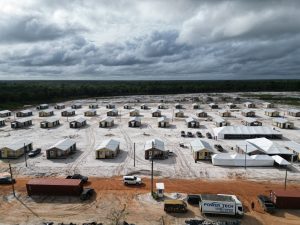Chief Justice rules Wednesday on case seeking to postpone Local Gov’t Elections

Chief Justice (ag) Roxane George will rule Wednesday on the case seeking to postpone Local Government Elections (LGE) over boundary grievances by the opposition PNC.
The date for LGE is June 12.
The ruling is expected at noon and the Chief Justice has made it clear that the Court’s consideration is on any unlawful act and not on the investments already made towards the elections.
In two separate hearings on Tuesday, the Chief Justice entertained oral arguments by the attorney for the Applicant, Linden Amsterdam, and Counsel for the Guyana Election Commission (GECOM), Kurt DaSilva.
The application in the High Court was made by Carol Joseph, the Chief Scrutineer of APNU, and a supporting affidavit was filed by Vincent Alexander, Commissioner of the Guyana Elections Commission (GECOM), in which he argues that the PNC will be disadvantaged if the June 12, 2023 elections go ahead with the boundaries that have been set out.
GECOM, by way of a majority vote on January 31, 2023, agreed to change the boundaries of 37 constituencies in 19 local authority areas. It subsequently issued an order to this effect. The changes were published in the official gazette on February 8, 2023.
Joseph, in her application, claims that this was done in violation of Article 72 of the Constitution and Section 3 (1) (a) and (b) of the Local Authorities Act Chapter 28:03.
Joseph wants the Court to issue an order directing GECOM to comply with the legal provisions cited before attempting to change the boundaries of any constituency in Guyana and before the holding of Local Government Elections.
On Tuesday, Attorney General Anil Nandlall and Government Parliamentarian Sanjeev Datadin were both denied their requests to intervene and be heard in the matter.
Datadin is representing Dr. Bharrat Jagdeo in his capacity as General Secretary of the governing People’s Progressive Party Civic (PPP/C) and head of the list.
They argued that the matter was of national importance and that both the state (AG Chambers) and the PPP/C were affected parties.
The CJ ruled that GECOM was independent and could properly represent itself, setting aside arguments that monies were already spent to run off the elections and the PPP/C was the only party contesting all the local authority areas.
“I’m not going to accept that as justification for permitting intervention. I don’t see it as a justification or proper reason.
“If affected parties must be heard then every citizen is effectively an affected party,” Justice George said.
The CJ noted too that she was not inclined to accept arguments that the new demarcations have created an unfair advantage for the governing party, particularly since Nandlall and Datadin were not allowed to intervene.
And DaSilva pointed out that GECOM carried out its duties in keeping with the law and did nothing to increase or reduce chances for any political party.
“Whether it turns out a party is more successful, that cannot be a consideration of GECOM,” he added.
Amsterdam was concerned particularly with the fact that not only new demarcations were made but new areas were created, initially by the Minister of Local Government and Regional Development, as he is empowered to do, and then ratified by GECOM.
Article 72 of the Constitution provides for the division of Guyana into sub-divisions as is necessary for the purpose of organising local democratic organs. In doing the division, consideration must be given to, among other things, the population, the physical size and geographic characteristics, and economic resources.
The Constitution also sets out that divisions should be provided for where there is the need for such and where the people request their establishment.












